Medication Management Policies: Reviewing Impact on Patient Safety
VerifiedAdded on 2023/06/11
|12
|2559
|145
Report
AI Summary
This report reviews medication management policies and their impact on patient safety, focusing on Nursing and Midwifery Council (NMC) guidelines and the National Clinical Audit and Patient Outcomes Programme (NCAPOP). It analyzes the adverse effects of medication mismanagement, including incorrect dosage, improper administration, and inadequate nursing education. The report also highlights factors contributing to medication errors, such as nurse burnout, high workload, and flawed drug labeling. It emphasizes the importance of patient-centered medication management, cultural sensitivity, and hand hygiene in preventing infections. The author's personal reflection underscores the importance of knowledge, skills, and patient interaction in ensuring optimal patient safety and culturally competent care. The report concludes that proper medication use and administration are crucial in patient care, requiring adherence to safety procedures and ongoing training for healthcare professionals. Desklib offers similar solved assignments and past papers for students.
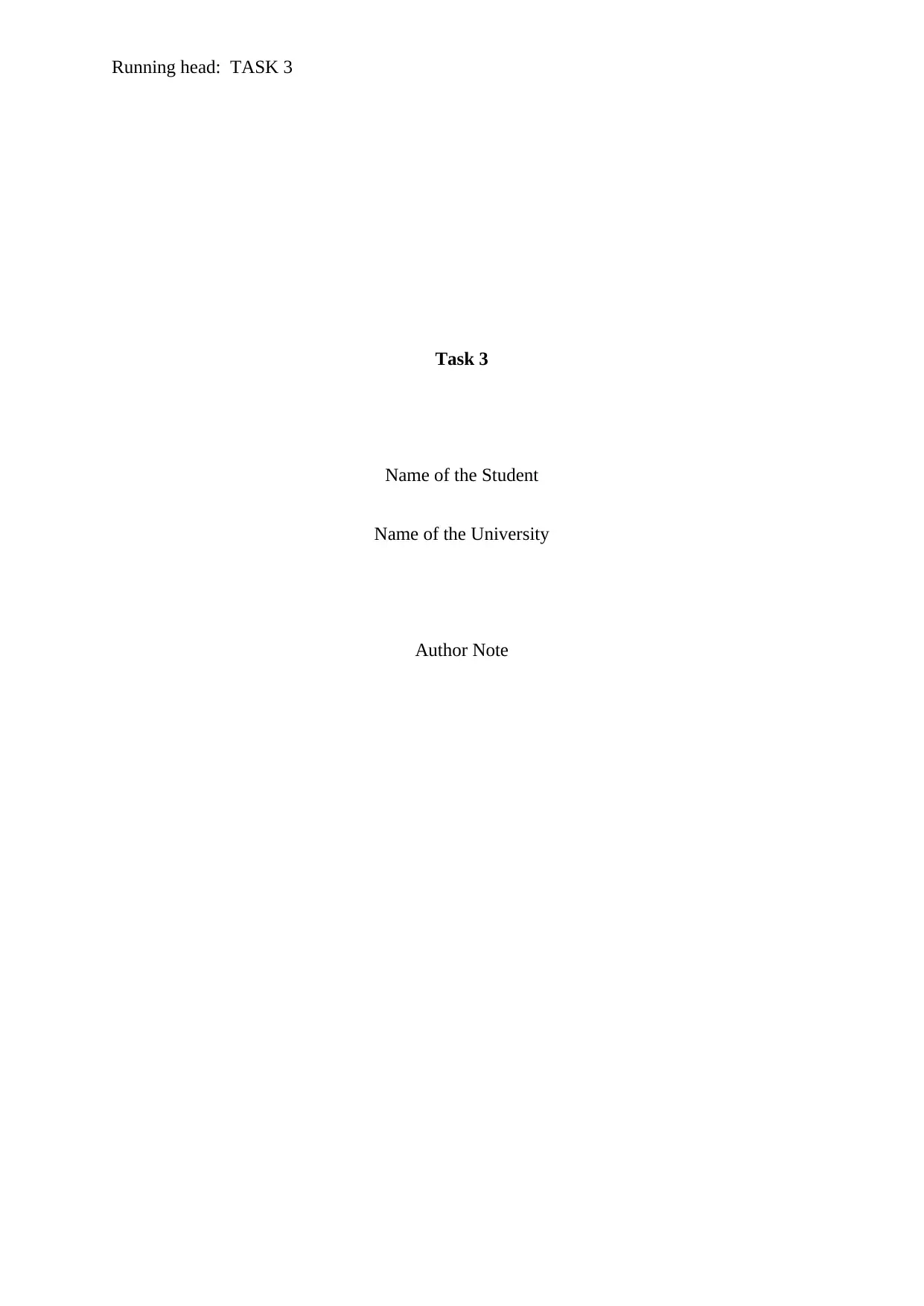
Running head: TASK 3
Task 3
Name of the Student
Name of the University
Author Note
Task 3
Name of the Student
Name of the University
Author Note
Paraphrase This Document
Need a fresh take? Get an instant paraphrase of this document with our AI Paraphraser
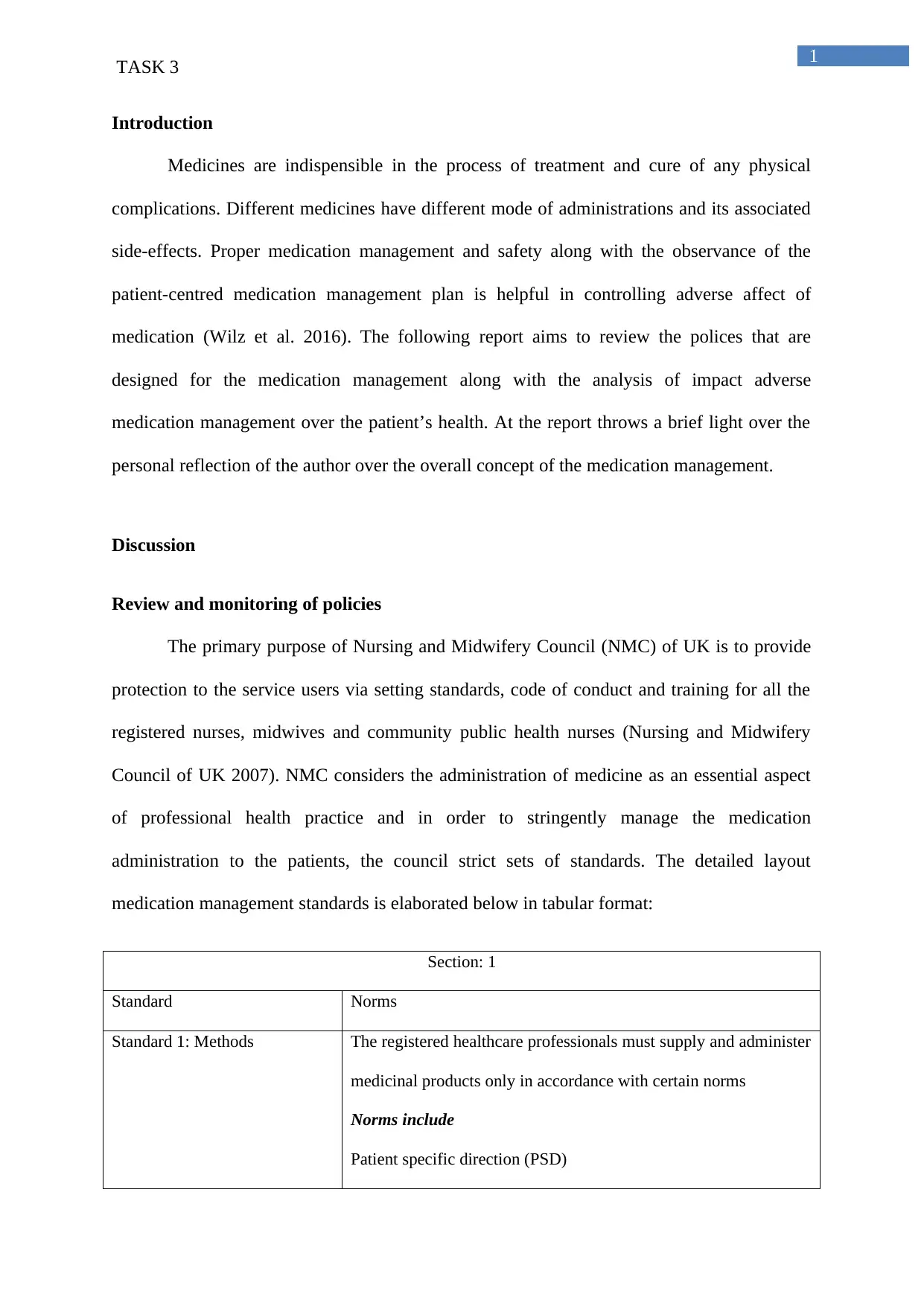
1
TASK 3
Introduction
Medicines are indispensible in the process of treatment and cure of any physical
complications. Different medicines have different mode of administrations and its associated
side-effects. Proper medication management and safety along with the observance of the
patient-centred medication management plan is helpful in controlling adverse affect of
medication (Wilz et al. 2016). The following report aims to review the polices that are
designed for the medication management along with the analysis of impact adverse
medication management over the patient’s health. At the report throws a brief light over the
personal reflection of the author over the overall concept of the medication management.
Discussion
Review and monitoring of policies
The primary purpose of Nursing and Midwifery Council (NMC) of UK is to provide
protection to the service users via setting standards, code of conduct and training for all the
registered nurses, midwives and community public health nurses (Nursing and Midwifery
Council of UK 2007). NMC considers the administration of medicine as an essential aspect
of professional health practice and in order to stringently manage the medication
administration to the patients, the council strict sets of standards. The detailed layout
medication management standards is elaborated below in tabular format:
Section: 1
Standard Norms
Standard 1: Methods The registered healthcare professionals must supply and administer
medicinal products only in accordance with certain norms
Norms include
Patient specific direction (PSD)
TASK 3
Introduction
Medicines are indispensible in the process of treatment and cure of any physical
complications. Different medicines have different mode of administrations and its associated
side-effects. Proper medication management and safety along with the observance of the
patient-centred medication management plan is helpful in controlling adverse affect of
medication (Wilz et al. 2016). The following report aims to review the polices that are
designed for the medication management along with the analysis of impact adverse
medication management over the patient’s health. At the report throws a brief light over the
personal reflection of the author over the overall concept of the medication management.
Discussion
Review and monitoring of policies
The primary purpose of Nursing and Midwifery Council (NMC) of UK is to provide
protection to the service users via setting standards, code of conduct and training for all the
registered nurses, midwives and community public health nurses (Nursing and Midwifery
Council of UK 2007). NMC considers the administration of medicine as an essential aspect
of professional health practice and in order to stringently manage the medication
administration to the patients, the council strict sets of standards. The detailed layout
medication management standards is elaborated below in tabular format:
Section: 1
Standard Norms
Standard 1: Methods The registered healthcare professionals must supply and administer
medicinal products only in accordance with certain norms
Norms include
Patient specific direction (PSD)
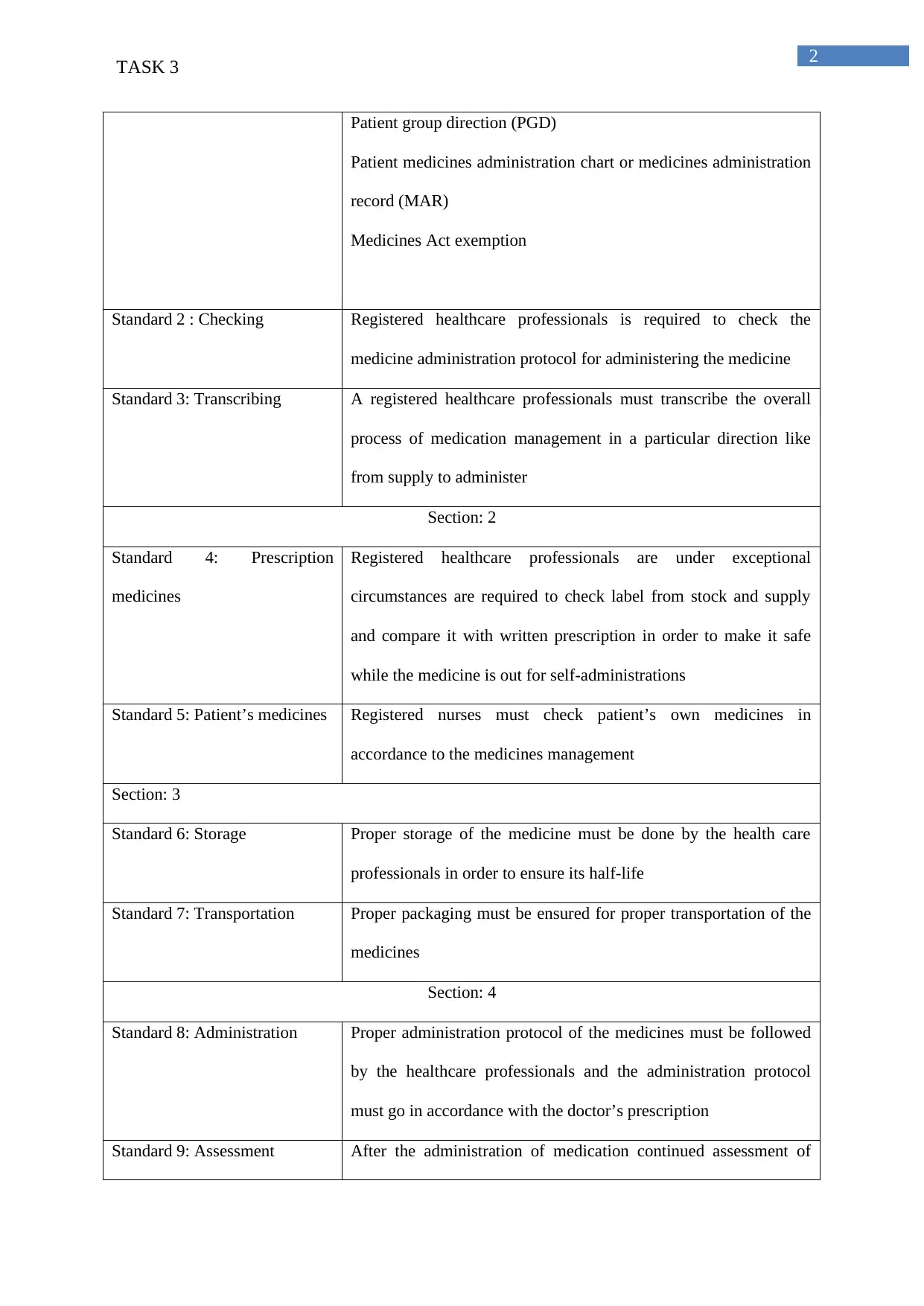
2
TASK 3
Patient group direction (PGD)
Patient medicines administration chart or medicines administration
record (MAR)
Medicines Act exemption
Standard 2 : Checking Registered healthcare professionals is required to check the
medicine administration protocol for administering the medicine
Standard 3: Transcribing A registered healthcare professionals must transcribe the overall
process of medication management in a particular direction like
from supply to administer
Section: 2
Standard 4: Prescription
medicines
Registered healthcare professionals are under exceptional
circumstances are required to check label from stock and supply
and compare it with written prescription in order to make it safe
while the medicine is out for self-administrations
Standard 5: Patient’s medicines Registered nurses must check patient’s own medicines in
accordance to the medicines management
Section: 3
Standard 6: Storage Proper storage of the medicine must be done by the health care
professionals in order to ensure its half-life
Standard 7: Transportation Proper packaging must be ensured for proper transportation of the
medicines
Section: 4
Standard 8: Administration Proper administration protocol of the medicines must be followed
by the healthcare professionals and the administration protocol
must go in accordance with the doctor’s prescription
Standard 9: Assessment After the administration of medication continued assessment of
TASK 3
Patient group direction (PGD)
Patient medicines administration chart or medicines administration
record (MAR)
Medicines Act exemption
Standard 2 : Checking Registered healthcare professionals is required to check the
medicine administration protocol for administering the medicine
Standard 3: Transcribing A registered healthcare professionals must transcribe the overall
process of medication management in a particular direction like
from supply to administer
Section: 2
Standard 4: Prescription
medicines
Registered healthcare professionals are under exceptional
circumstances are required to check label from stock and supply
and compare it with written prescription in order to make it safe
while the medicine is out for self-administrations
Standard 5: Patient’s medicines Registered nurses must check patient’s own medicines in
accordance to the medicines management
Section: 3
Standard 6: Storage Proper storage of the medicine must be done by the health care
professionals in order to ensure its half-life
Standard 7: Transportation Proper packaging must be ensured for proper transportation of the
medicines
Section: 4
Standard 8: Administration Proper administration protocol of the medicines must be followed
by the healthcare professionals and the administration protocol
must go in accordance with the doctor’s prescription
Standard 9: Assessment After the administration of medication continued assessment of
⊘ This is a preview!⊘
Do you want full access?
Subscribe today to unlock all pages.

Trusted by 1+ million students worldwide
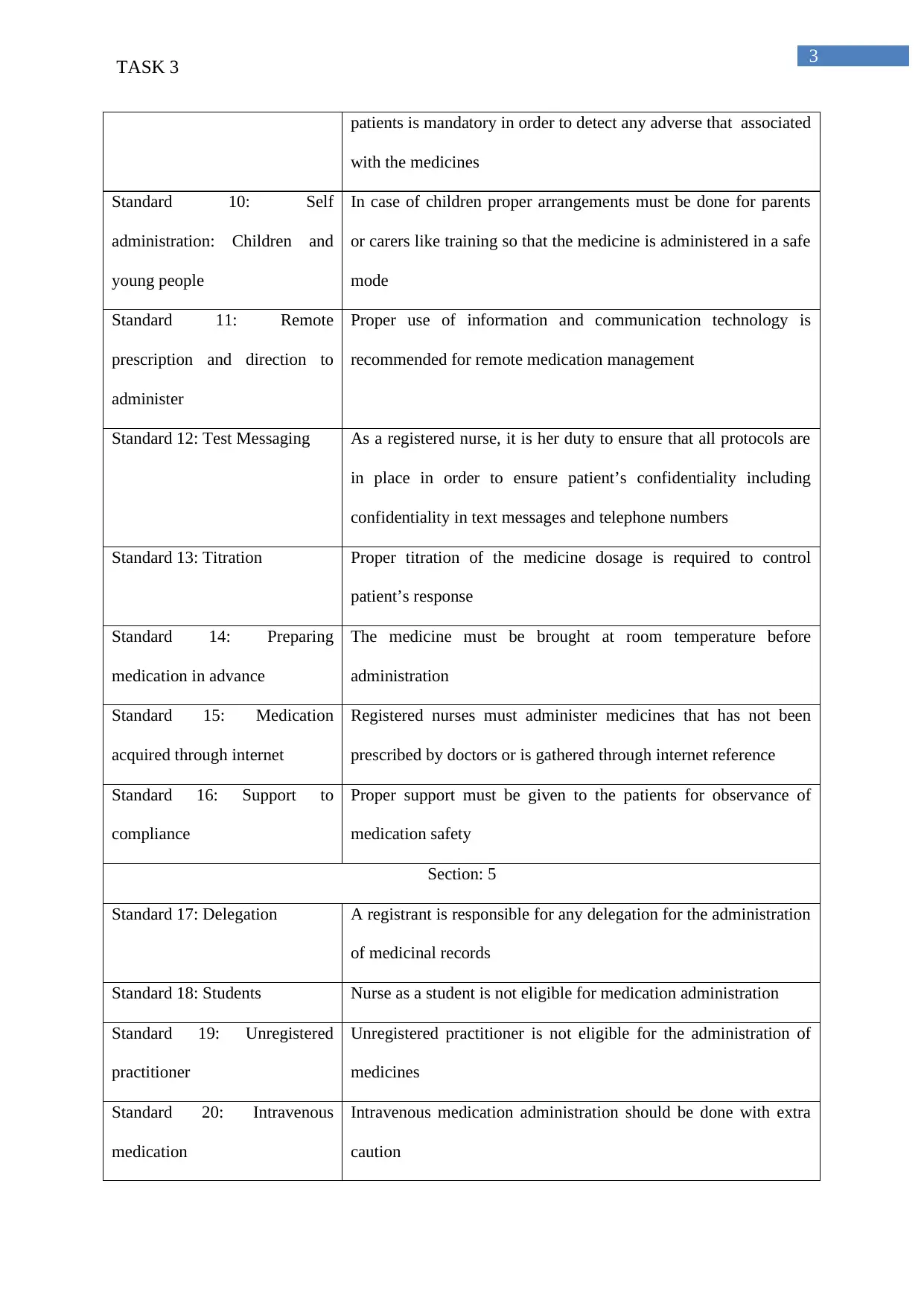
3
TASK 3
patients is mandatory in order to detect any adverse that associated
with the medicines
Standard 10: Self
administration: Children and
young people
In case of children proper arrangements must be done for parents
or carers like training so that the medicine is administered in a safe
mode
Standard 11: Remote
prescription and direction to
administer
Proper use of information and communication technology is
recommended for remote medication management
Standard 12: Test Messaging As a registered nurse, it is her duty to ensure that all protocols are
in place in order to ensure patient’s confidentiality including
confidentiality in text messages and telephone numbers
Standard 13: Titration Proper titration of the medicine dosage is required to control
patient’s response
Standard 14: Preparing
medication in advance
The medicine must be brought at room temperature before
administration
Standard 15: Medication
acquired through internet
Registered nurses must administer medicines that has not been
prescribed by doctors or is gathered through internet reference
Standard 16: Support to
compliance
Proper support must be given to the patients for observance of
medication safety
Section: 5
Standard 17: Delegation A registrant is responsible for any delegation for the administration
of medicinal records
Standard 18: Students Nurse as a student is not eligible for medication administration
Standard 19: Unregistered
practitioner
Unregistered practitioner is not eligible for the administration of
medicines
Standard 20: Intravenous
medication
Intravenous medication administration should be done with extra
caution
TASK 3
patients is mandatory in order to detect any adverse that associated
with the medicines
Standard 10: Self
administration: Children and
young people
In case of children proper arrangements must be done for parents
or carers like training so that the medicine is administered in a safe
mode
Standard 11: Remote
prescription and direction to
administer
Proper use of information and communication technology is
recommended for remote medication management
Standard 12: Test Messaging As a registered nurse, it is her duty to ensure that all protocols are
in place in order to ensure patient’s confidentiality including
confidentiality in text messages and telephone numbers
Standard 13: Titration Proper titration of the medicine dosage is required to control
patient’s response
Standard 14: Preparing
medication in advance
The medicine must be brought at room temperature before
administration
Standard 15: Medication
acquired through internet
Registered nurses must administer medicines that has not been
prescribed by doctors or is gathered through internet reference
Standard 16: Support to
compliance
Proper support must be given to the patients for observance of
medication safety
Section: 5
Standard 17: Delegation A registrant is responsible for any delegation for the administration
of medicinal records
Standard 18: Students Nurse as a student is not eligible for medication administration
Standard 19: Unregistered
practitioner
Unregistered practitioner is not eligible for the administration of
medicines
Standard 20: Intravenous
medication
Intravenous medication administration should be done with extra
caution
Paraphrase This Document
Need a fresh take? Get an instant paraphrase of this document with our AI Paraphraser
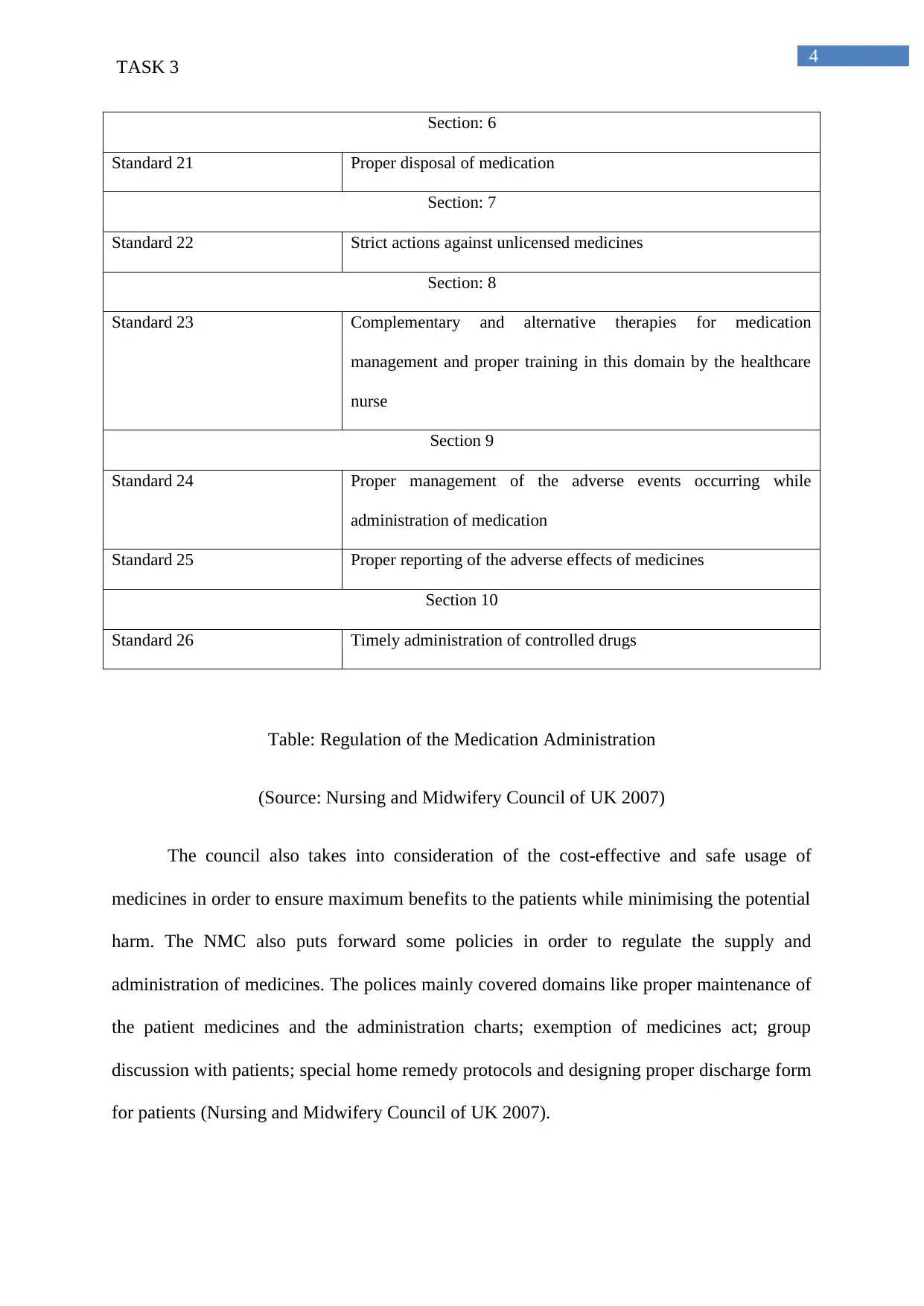
4
TASK 3
Section: 6
Standard 21 Proper disposal of medication
Section: 7
Standard 22 Strict actions against unlicensed medicines
Section: 8
Standard 23 Complementary and alternative therapies for medication
management and proper training in this domain by the healthcare
nurse
Section 9
Standard 24 Proper management of the adverse events occurring while
administration of medication
Standard 25 Proper reporting of the adverse effects of medicines
Section 10
Standard 26 Timely administration of controlled drugs
Table: Regulation of the Medication Administration
(Source: Nursing and Midwifery Council of UK 2007)
The council also takes into consideration of the cost-effective and safe usage of
medicines in order to ensure maximum benefits to the patients while minimising the potential
harm. The NMC also puts forward some policies in order to regulate the supply and
administration of medicines. The polices mainly covered domains like proper maintenance of
the patient medicines and the administration charts; exemption of medicines act; group
discussion with patients; special home remedy protocols and designing proper discharge form
for patients (Nursing and Midwifery Council of UK 2007).
TASK 3
Section: 6
Standard 21 Proper disposal of medication
Section: 7
Standard 22 Strict actions against unlicensed medicines
Section: 8
Standard 23 Complementary and alternative therapies for medication
management and proper training in this domain by the healthcare
nurse
Section 9
Standard 24 Proper management of the adverse events occurring while
administration of medication
Standard 25 Proper reporting of the adverse effects of medicines
Section 10
Standard 26 Timely administration of controlled drugs
Table: Regulation of the Medication Administration
(Source: Nursing and Midwifery Council of UK 2007)
The council also takes into consideration of the cost-effective and safe usage of
medicines in order to ensure maximum benefits to the patients while minimising the potential
harm. The NMC also puts forward some policies in order to regulate the supply and
administration of medicines. The polices mainly covered domains like proper maintenance of
the patient medicines and the administration charts; exemption of medicines act; group
discussion with patients; special home remedy protocols and designing proper discharge form
for patients (Nursing and Midwifery Council of UK 2007).
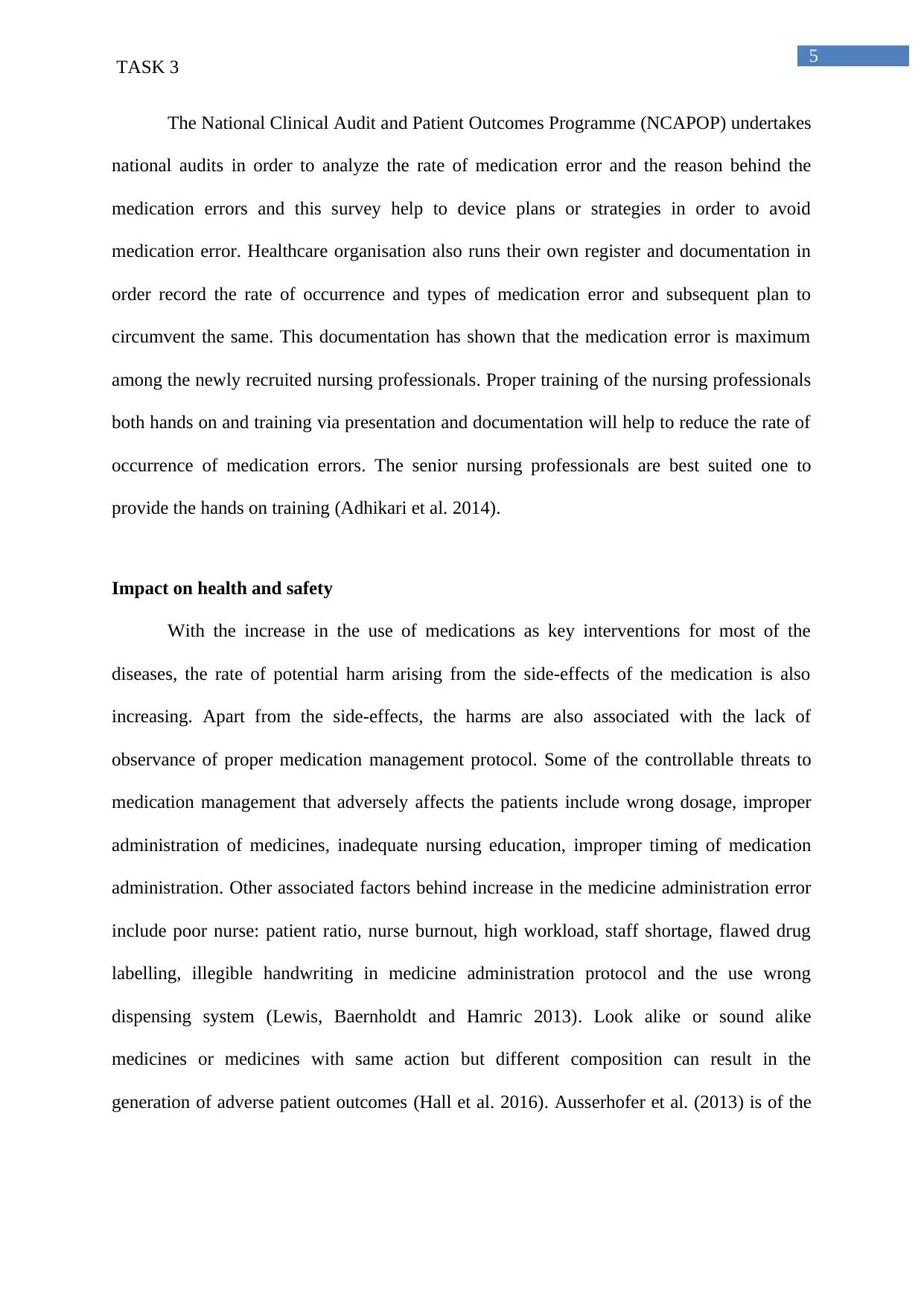
5
TASK 3
The National Clinical Audit and Patient Outcomes Programme (NCAPOP) undertakes
national audits in order to analyze the rate of medication error and the reason behind the
medication errors and this survey help to device plans or strategies in order to avoid
medication error. Healthcare organisation also runs their own register and documentation in
order record the rate of occurrence and types of medication error and subsequent plan to
circumvent the same. This documentation has shown that the medication error is maximum
among the newly recruited nursing professionals. Proper training of the nursing professionals
both hands on and training via presentation and documentation will help to reduce the rate of
occurrence of medication errors. The senior nursing professionals are best suited one to
provide the hands on training (Adhikari et al. 2014).
Impact on health and safety
With the increase in the use of medications as key interventions for most of the
diseases, the rate of potential harm arising from the side-effects of the medication is also
increasing. Apart from the side-effects, the harms are also associated with the lack of
observance of proper medication management protocol. Some of the controllable threats to
medication management that adversely affects the patients include wrong dosage, improper
administration of medicines, inadequate nursing education, improper timing of medication
administration. Other associated factors behind increase in the medicine administration error
include poor nurse: patient ratio, nurse burnout, high workload, staff shortage, flawed drug
labelling, illegible handwriting in medicine administration protocol and the use wrong
dispensing system (Lewis, Baernholdt and Hamric 2013). Look alike or sound alike
medicines or medicines with same action but different composition can result in the
generation of adverse patient outcomes (Hall et al. 2016). Ausserhofer et al. (2013) is of the
TASK 3
The National Clinical Audit and Patient Outcomes Programme (NCAPOP) undertakes
national audits in order to analyze the rate of medication error and the reason behind the
medication errors and this survey help to device plans or strategies in order to avoid
medication error. Healthcare organisation also runs their own register and documentation in
order record the rate of occurrence and types of medication error and subsequent plan to
circumvent the same. This documentation has shown that the medication error is maximum
among the newly recruited nursing professionals. Proper training of the nursing professionals
both hands on and training via presentation and documentation will help to reduce the rate of
occurrence of medication errors. The senior nursing professionals are best suited one to
provide the hands on training (Adhikari et al. 2014).
Impact on health and safety
With the increase in the use of medications as key interventions for most of the
diseases, the rate of potential harm arising from the side-effects of the medication is also
increasing. Apart from the side-effects, the harms are also associated with the lack of
observance of proper medication management protocol. Some of the controllable threats to
medication management that adversely affects the patients include wrong dosage, improper
administration of medicines, inadequate nursing education, improper timing of medication
administration. Other associated factors behind increase in the medicine administration error
include poor nurse: patient ratio, nurse burnout, high workload, staff shortage, flawed drug
labelling, illegible handwriting in medicine administration protocol and the use wrong
dispensing system (Lewis, Baernholdt and Hamric 2013). Look alike or sound alike
medicines or medicines with same action but different composition can result in the
generation of adverse patient outcomes (Hall et al. 2016). Ausserhofer et al. (2013) is of the
⊘ This is a preview!⊘
Do you want full access?
Subscribe today to unlock all pages.

Trusted by 1+ million students worldwide
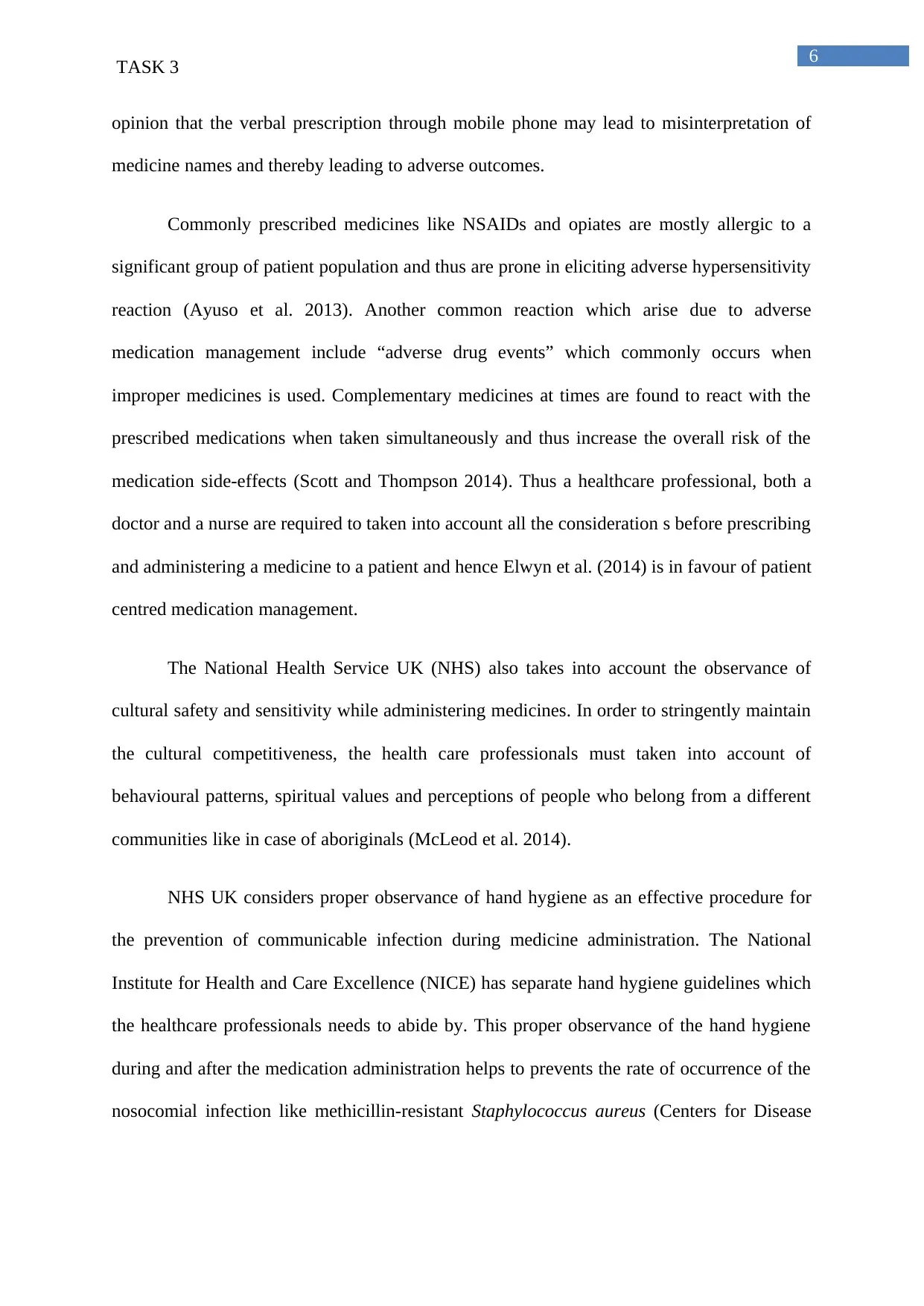
6
TASK 3
opinion that the verbal prescription through mobile phone may lead to misinterpretation of
medicine names and thereby leading to adverse outcomes.
Commonly prescribed medicines like NSAIDs and opiates are mostly allergic to a
significant group of patient population and thus are prone in eliciting adverse hypersensitivity
reaction (Ayuso et al. 2013). Another common reaction which arise due to adverse
medication management include “adverse drug events” which commonly occurs when
improper medicines is used. Complementary medicines at times are found to react with the
prescribed medications when taken simultaneously and thus increase the overall risk of the
medication side-effects (Scott and Thompson 2014). Thus a healthcare professional, both a
doctor and a nurse are required to taken into account all the consideration s before prescribing
and administering a medicine to a patient and hence Elwyn et al. (2014) is in favour of patient
centred medication management.
The National Health Service UK (NHS) also takes into account the observance of
cultural safety and sensitivity while administering medicines. In order to stringently maintain
the cultural competitiveness, the health care professionals must taken into account of
behavioural patterns, spiritual values and perceptions of people who belong from a different
communities like in case of aboriginals (McLeod et al. 2014).
NHS UK considers proper observance of hand hygiene as an effective procedure for
the prevention of communicable infection during medicine administration. The National
Institute for Health and Care Excellence (NICE) has separate hand hygiene guidelines which
the healthcare professionals needs to abide by. This proper observance of the hand hygiene
during and after the medication administration helps to prevents the rate of occurrence of the
nosocomial infection like methicillin-resistant Staphylococcus aureus (Centers for Disease
TASK 3
opinion that the verbal prescription through mobile phone may lead to misinterpretation of
medicine names and thereby leading to adverse outcomes.
Commonly prescribed medicines like NSAIDs and opiates are mostly allergic to a
significant group of patient population and thus are prone in eliciting adverse hypersensitivity
reaction (Ayuso et al. 2013). Another common reaction which arise due to adverse
medication management include “adverse drug events” which commonly occurs when
improper medicines is used. Complementary medicines at times are found to react with the
prescribed medications when taken simultaneously and thus increase the overall risk of the
medication side-effects (Scott and Thompson 2014). Thus a healthcare professional, both a
doctor and a nurse are required to taken into account all the consideration s before prescribing
and administering a medicine to a patient and hence Elwyn et al. (2014) is in favour of patient
centred medication management.
The National Health Service UK (NHS) also takes into account the observance of
cultural safety and sensitivity while administering medicines. In order to stringently maintain
the cultural competitiveness, the health care professionals must taken into account of
behavioural patterns, spiritual values and perceptions of people who belong from a different
communities like in case of aboriginals (McLeod et al. 2014).
NHS UK considers proper observance of hand hygiene as an effective procedure for
the prevention of communicable infection during medicine administration. The National
Institute for Health and Care Excellence (NICE) has separate hand hygiene guidelines which
the healthcare professionals needs to abide by. This proper observance of the hand hygiene
during and after the medication administration helps to prevents the rate of occurrence of the
nosocomial infection like methicillin-resistant Staphylococcus aureus (Centers for Disease
Paraphrase This Document
Need a fresh take? Get an instant paraphrase of this document with our AI Paraphraser
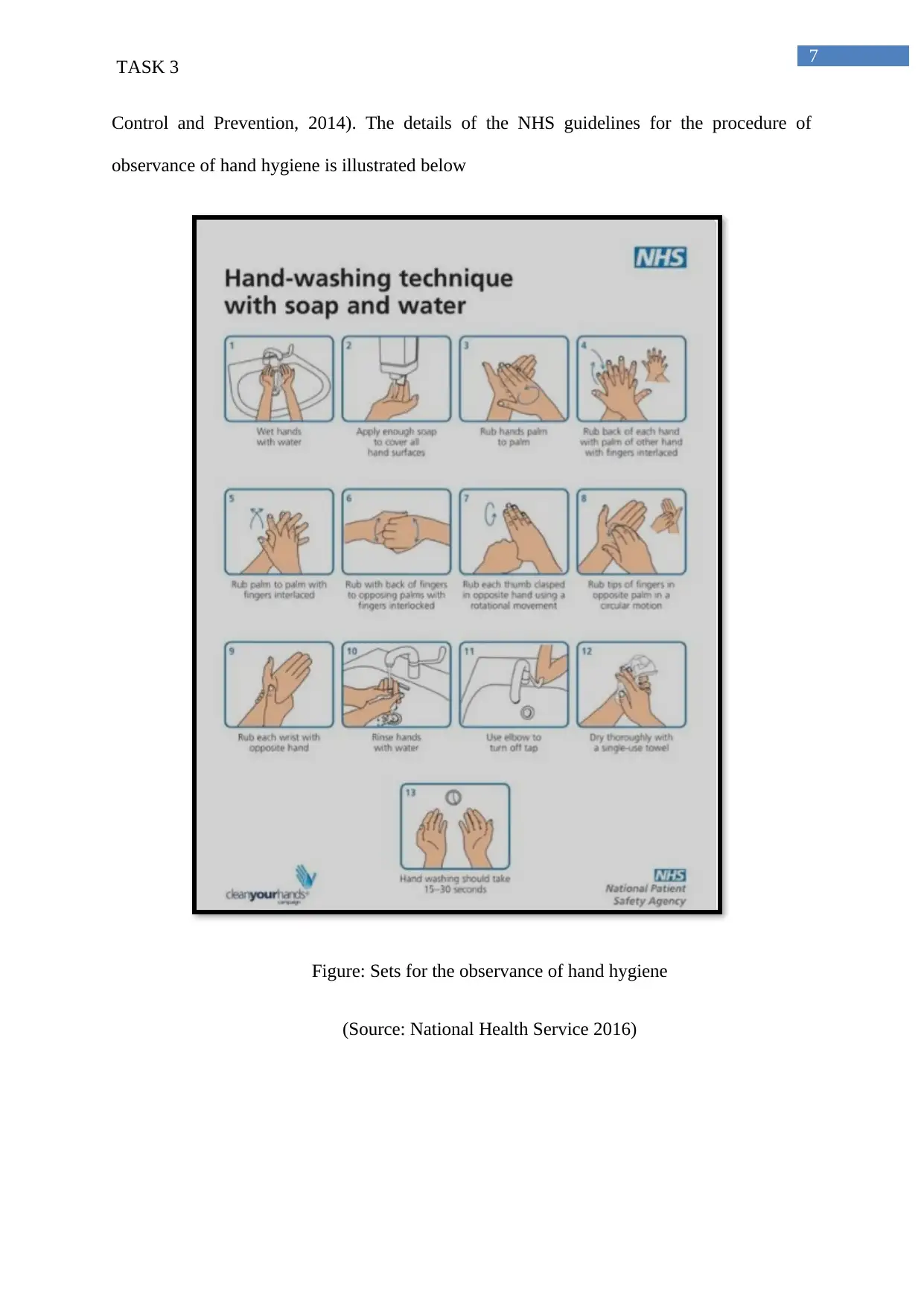
7
TASK 3
Control and Prevention, 2014). The details of the NHS guidelines for the procedure of
observance of hand hygiene is illustrated below
Figure: Sets for the observance of hand hygiene
(Source: National Health Service 2016)
TASK 3
Control and Prevention, 2014). The details of the NHS guidelines for the procedure of
observance of hand hygiene is illustrated below
Figure: Sets for the observance of hand hygiene
(Source: National Health Service 2016)
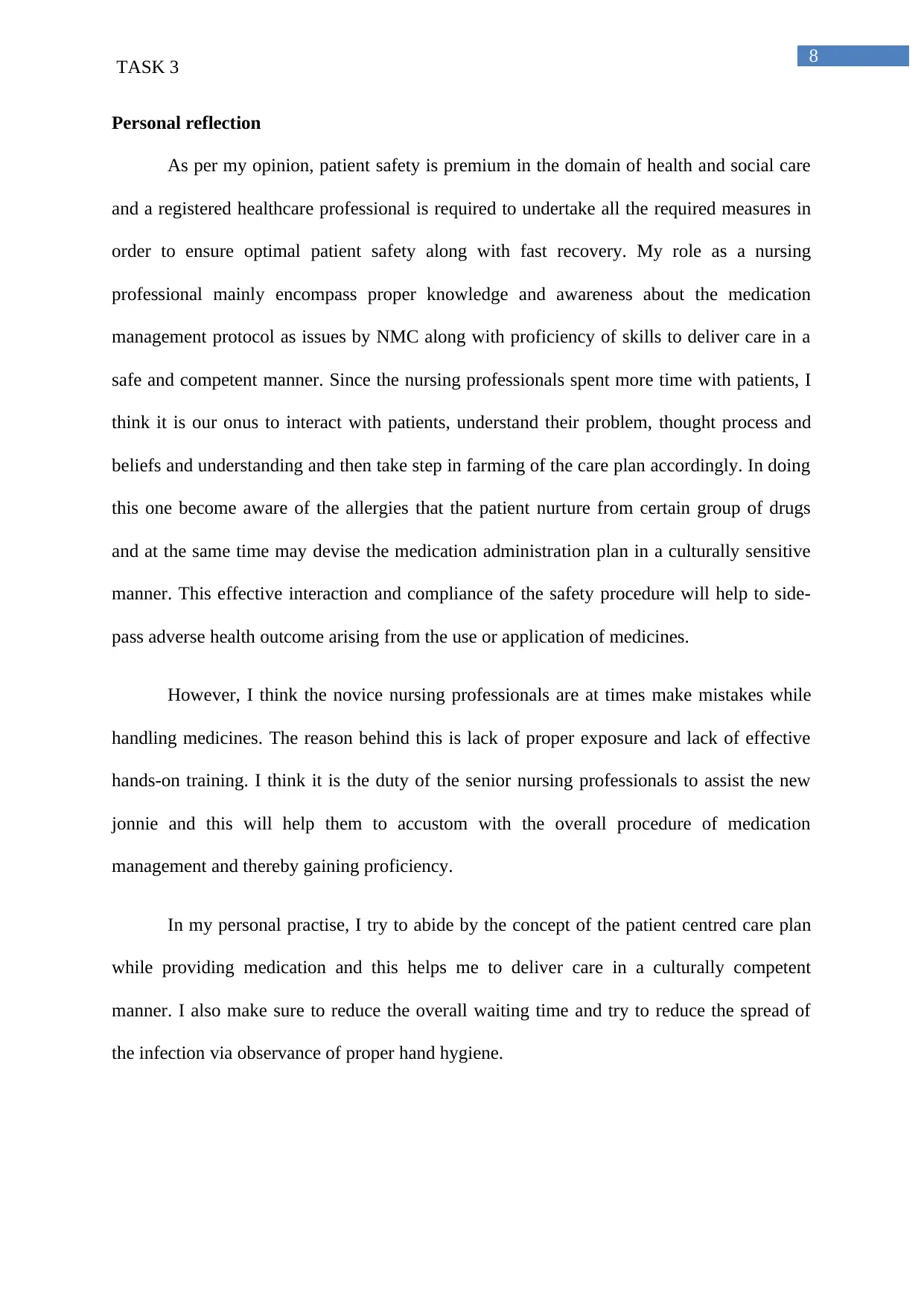
8
TASK 3
Personal reflection
As per my opinion, patient safety is premium in the domain of health and social care
and a registered healthcare professional is required to undertake all the required measures in
order to ensure optimal patient safety along with fast recovery. My role as a nursing
professional mainly encompass proper knowledge and awareness about the medication
management protocol as issues by NMC along with proficiency of skills to deliver care in a
safe and competent manner. Since the nursing professionals spent more time with patients, I
think it is our onus to interact with patients, understand their problem, thought process and
beliefs and understanding and then take step in farming of the care plan accordingly. In doing
this one become aware of the allergies that the patient nurture from certain group of drugs
and at the same time may devise the medication administration plan in a culturally sensitive
manner. This effective interaction and compliance of the safety procedure will help to side-
pass adverse health outcome arising from the use or application of medicines.
However, I think the novice nursing professionals are at times make mistakes while
handling medicines. The reason behind this is lack of proper exposure and lack of effective
hands-on training. I think it is the duty of the senior nursing professionals to assist the new
jonnie and this will help them to accustom with the overall procedure of medication
management and thereby gaining proficiency.
In my personal practise, I try to abide by the concept of the patient centred care plan
while providing medication and this helps me to deliver care in a culturally competent
manner. I also make sure to reduce the overall waiting time and try to reduce the spread of
the infection via observance of proper hand hygiene.
TASK 3
Personal reflection
As per my opinion, patient safety is premium in the domain of health and social care
and a registered healthcare professional is required to undertake all the required measures in
order to ensure optimal patient safety along with fast recovery. My role as a nursing
professional mainly encompass proper knowledge and awareness about the medication
management protocol as issues by NMC along with proficiency of skills to deliver care in a
safe and competent manner. Since the nursing professionals spent more time with patients, I
think it is our onus to interact with patients, understand their problem, thought process and
beliefs and understanding and then take step in farming of the care plan accordingly. In doing
this one become aware of the allergies that the patient nurture from certain group of drugs
and at the same time may devise the medication administration plan in a culturally sensitive
manner. This effective interaction and compliance of the safety procedure will help to side-
pass adverse health outcome arising from the use or application of medicines.
However, I think the novice nursing professionals are at times make mistakes while
handling medicines. The reason behind this is lack of proper exposure and lack of effective
hands-on training. I think it is the duty of the senior nursing professionals to assist the new
jonnie and this will help them to accustom with the overall procedure of medication
management and thereby gaining proficiency.
In my personal practise, I try to abide by the concept of the patient centred care plan
while providing medication and this helps me to deliver care in a culturally competent
manner. I also make sure to reduce the overall waiting time and try to reduce the spread of
the infection via observance of proper hand hygiene.
⊘ This is a preview!⊘
Do you want full access?
Subscribe today to unlock all pages.

Trusted by 1+ million students worldwide
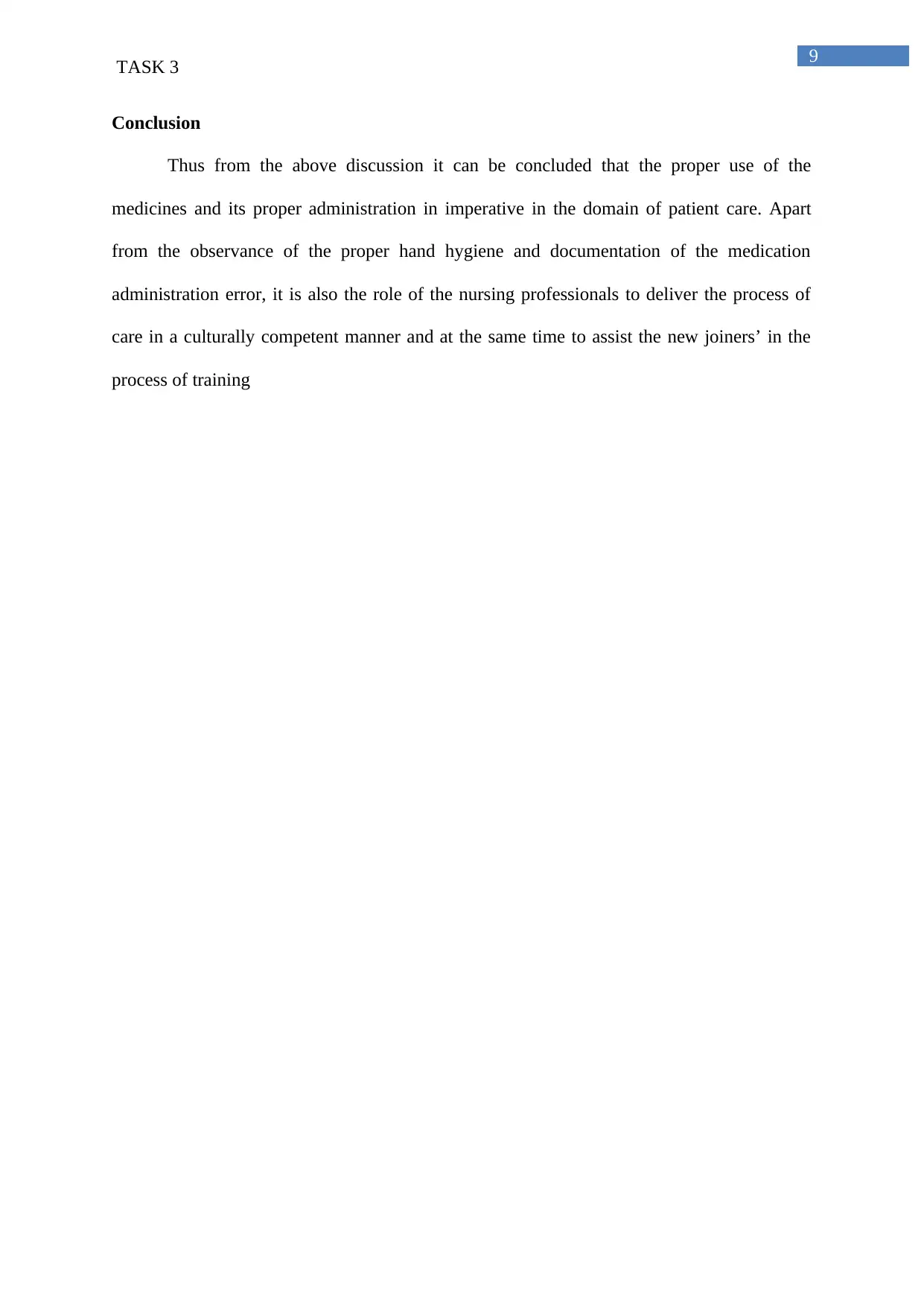
9
TASK 3
Conclusion
Thus from the above discussion it can be concluded that the proper use of the
medicines and its proper administration in imperative in the domain of patient care. Apart
from the observance of the proper hand hygiene and documentation of the medication
administration error, it is also the role of the nursing professionals to deliver the process of
care in a culturally competent manner and at the same time to assist the new joiners’ in the
process of training
TASK 3
Conclusion
Thus from the above discussion it can be concluded that the proper use of the
medicines and its proper administration in imperative in the domain of patient care. Apart
from the observance of the proper hand hygiene and documentation of the medication
administration error, it is also the role of the nursing professionals to deliver the process of
care in a culturally competent manner and at the same time to assist the new joiners’ in the
process of training
Paraphrase This Document
Need a fresh take? Get an instant paraphrase of this document with our AI Paraphraser
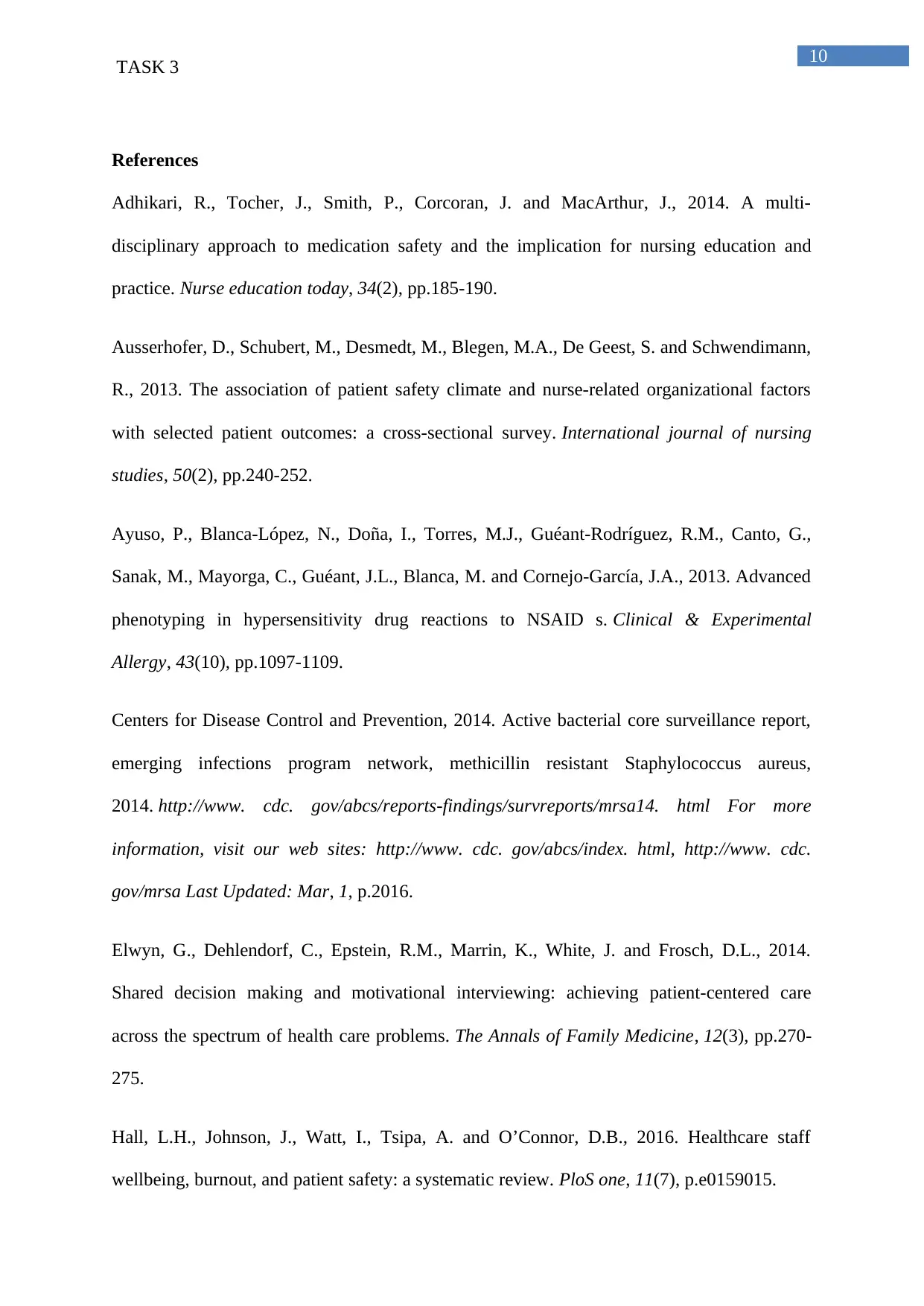
10
TASK 3
References
Adhikari, R., Tocher, J., Smith, P., Corcoran, J. and MacArthur, J., 2014. A multi-
disciplinary approach to medication safety and the implication for nursing education and
practice. Nurse education today, 34(2), pp.185-190.
Ausserhofer, D., Schubert, M., Desmedt, M., Blegen, M.A., De Geest, S. and Schwendimann,
R., 2013. The association of patient safety climate and nurse-related organizational factors
with selected patient outcomes: a cross-sectional survey. International journal of nursing
studies, 50(2), pp.240-252.
Ayuso, P., Blanca‐López, N., Doña, I., Torres, M.J., Guéant‐Rodríguez, R.M., Canto, G.,
Sanak, M., Mayorga, C., Guéant, J.L., Blanca, M. and Cornejo‐García, J.A., 2013. Advanced
phenotyping in hypersensitivity drug reactions to NSAID s. Clinical & Experimental
Allergy, 43(10), pp.1097-1109.
Centers for Disease Control and Prevention, 2014. Active bacterial core surveillance report,
emerging infections program network, methicillin resistant Staphylococcus aureus,
2014. http://www. cdc. gov/abcs/reports-findings/survreports/mrsa14. html For more
information, visit our web sites: http://www. cdc. gov/abcs/index. html, http://www. cdc.
gov/mrsa Last Updated: Mar, 1, p.2016.
Elwyn, G., Dehlendorf, C., Epstein, R.M., Marrin, K., White, J. and Frosch, D.L., 2014.
Shared decision making and motivational interviewing: achieving patient-centered care
across the spectrum of health care problems. The Annals of Family Medicine, 12(3), pp.270-
275.
Hall, L.H., Johnson, J., Watt, I., Tsipa, A. and O’Connor, D.B., 2016. Healthcare staff
wellbeing, burnout, and patient safety: a systematic review. PloS one, 11(7), p.e0159015.
TASK 3
References
Adhikari, R., Tocher, J., Smith, P., Corcoran, J. and MacArthur, J., 2014. A multi-
disciplinary approach to medication safety and the implication for nursing education and
practice. Nurse education today, 34(2), pp.185-190.
Ausserhofer, D., Schubert, M., Desmedt, M., Blegen, M.A., De Geest, S. and Schwendimann,
R., 2013. The association of patient safety climate and nurse-related organizational factors
with selected patient outcomes: a cross-sectional survey. International journal of nursing
studies, 50(2), pp.240-252.
Ayuso, P., Blanca‐López, N., Doña, I., Torres, M.J., Guéant‐Rodríguez, R.M., Canto, G.,
Sanak, M., Mayorga, C., Guéant, J.L., Blanca, M. and Cornejo‐García, J.A., 2013. Advanced
phenotyping in hypersensitivity drug reactions to NSAID s. Clinical & Experimental
Allergy, 43(10), pp.1097-1109.
Centers for Disease Control and Prevention, 2014. Active bacterial core surveillance report,
emerging infections program network, methicillin resistant Staphylococcus aureus,
2014. http://www. cdc. gov/abcs/reports-findings/survreports/mrsa14. html For more
information, visit our web sites: http://www. cdc. gov/abcs/index. html, http://www. cdc.
gov/mrsa Last Updated: Mar, 1, p.2016.
Elwyn, G., Dehlendorf, C., Epstein, R.M., Marrin, K., White, J. and Frosch, D.L., 2014.
Shared decision making and motivational interviewing: achieving patient-centered care
across the spectrum of health care problems. The Annals of Family Medicine, 12(3), pp.270-
275.
Hall, L.H., Johnson, J., Watt, I., Tsipa, A. and O’Connor, D.B., 2016. Healthcare staff
wellbeing, burnout, and patient safety: a systematic review. PloS one, 11(7), p.e0159015.
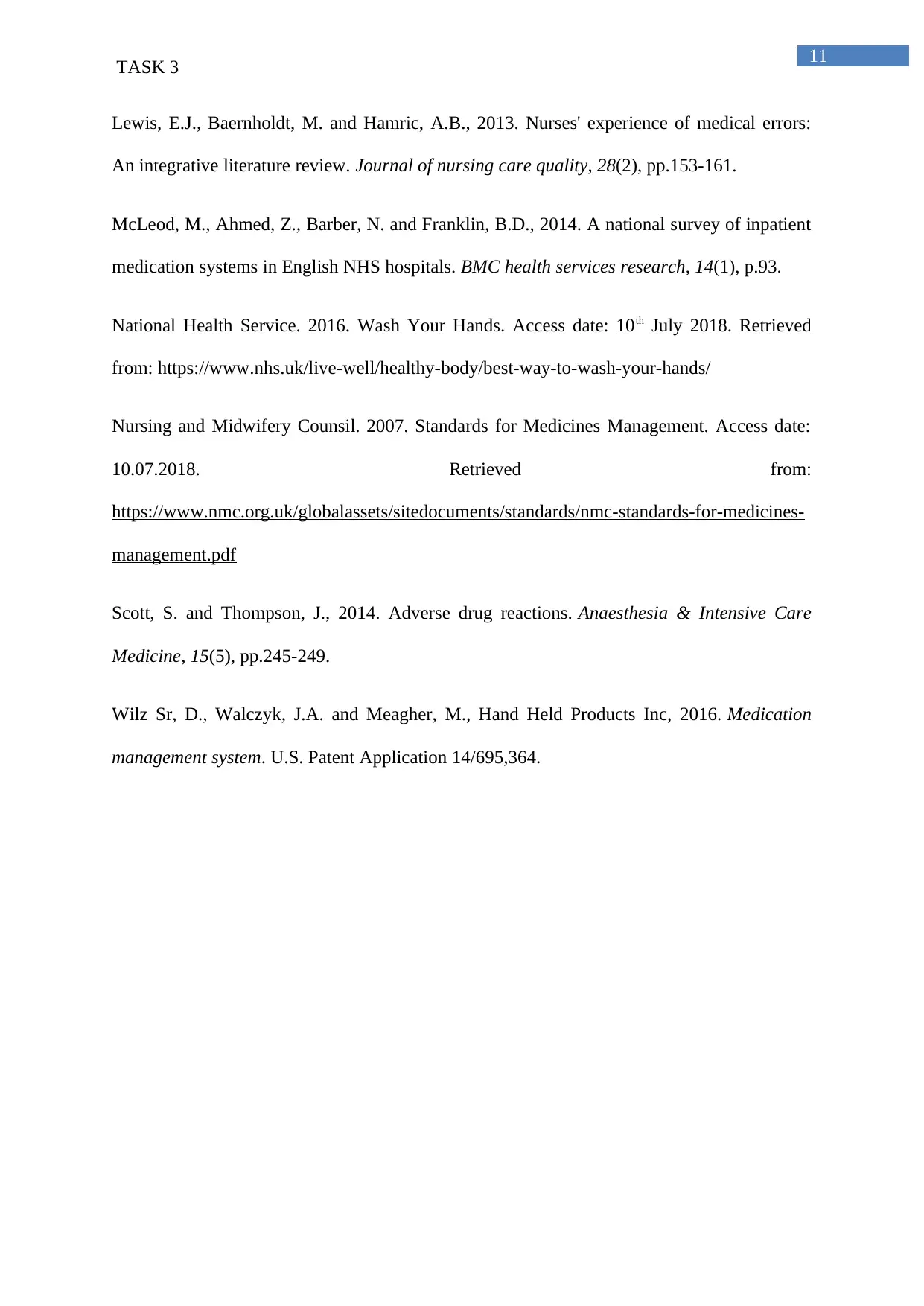
11
TASK 3
Lewis, E.J., Baernholdt, M. and Hamric, A.B., 2013. Nurses' experience of medical errors:
An integrative literature review. Journal of nursing care quality, 28(2), pp.153-161.
McLeod, M., Ahmed, Z., Barber, N. and Franklin, B.D., 2014. A national survey of inpatient
medication systems in English NHS hospitals. BMC health services research, 14(1), p.93.
National Health Service. 2016. Wash Your Hands. Access date: 10th July 2018. Retrieved
from: https://www.nhs.uk/live-well/healthy-body/best-way-to-wash-your-hands/
Nursing and Midwifery Counsil. 2007. Standards for Medicines Management. Access date:
10.07.2018. Retrieved from:
https://www.nmc.org.uk/globalassets/sitedocuments/standards/nmc-standards-for-medicines-
management.pdf
Scott, S. and Thompson, J., 2014. Adverse drug reactions. Anaesthesia & Intensive Care
Medicine, 15(5), pp.245-249.
Wilz Sr, D., Walczyk, J.A. and Meagher, M., Hand Held Products Inc, 2016. Medication
management system. U.S. Patent Application 14/695,364.
TASK 3
Lewis, E.J., Baernholdt, M. and Hamric, A.B., 2013. Nurses' experience of medical errors:
An integrative literature review. Journal of nursing care quality, 28(2), pp.153-161.
McLeod, M., Ahmed, Z., Barber, N. and Franklin, B.D., 2014. A national survey of inpatient
medication systems in English NHS hospitals. BMC health services research, 14(1), p.93.
National Health Service. 2016. Wash Your Hands. Access date: 10th July 2018. Retrieved
from: https://www.nhs.uk/live-well/healthy-body/best-way-to-wash-your-hands/
Nursing and Midwifery Counsil. 2007. Standards for Medicines Management. Access date:
10.07.2018. Retrieved from:
https://www.nmc.org.uk/globalassets/sitedocuments/standards/nmc-standards-for-medicines-
management.pdf
Scott, S. and Thompson, J., 2014. Adverse drug reactions. Anaesthesia & Intensive Care
Medicine, 15(5), pp.245-249.
Wilz Sr, D., Walczyk, J.A. and Meagher, M., Hand Held Products Inc, 2016. Medication
management system. U.S. Patent Application 14/695,364.
⊘ This is a preview!⊘
Do you want full access?
Subscribe today to unlock all pages.

Trusted by 1+ million students worldwide
1 out of 12